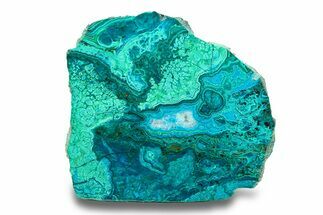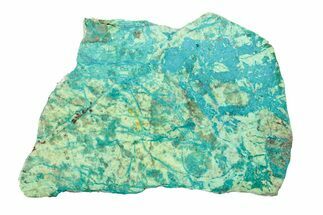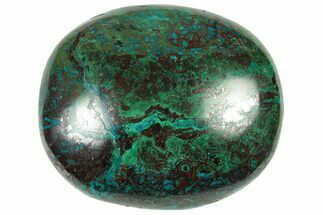This Specimen has been sold.
2.2" Polished Chrysocolla Sphere - Bagdad Mine, Arizona
This is a polished chrysocolla specimen, collected from the Bagdad Copper Mine in Arizona. It has wonderful blue-green coloration and has been shaped and polished into a sphere. Comes with the pictured display stand.
This material was mined in 1992-1993.
This material was mined in 1992-1993.
The Bagdad Mine is located in Yavapai County, Arizona and has mined copper since its discovery in 1882. It is one of the highest producing copper reserves on the planet, yielding upwards of 170 million pounds annually. The mine also produces significant amounts of molybdenum, of which the mine can leach nearly 75,000 metric tons of material daily. Mineral byproducts of this mine include chalcopyrite, azurite, malachite, and chrysocolla.
Although Bagdad Mine is one of the largest copper deposits in the world, it also produces absolutely breathtaking chrysocolla specimens. Our phenomenal specimens are typically a banded aggregation of chrysocolla, malachite, and quartz crystals. These minerals form in oxidation zones over the large copper deposits that are actively mined for the increasingly important metal. This means that many of these stunning minerals are thrown away in the overburden during the ore extraction process.
Given that chrysocolla is a secondary mineral that will form over other secondary, copper-based minerals, it is unsurprising that most chrysocolla coming out of the Bagdad Mine is in close association with malachite. Both minerals commonly form in fibrous arrays and botryoidal masses that layer nicely over other minerals. Chrysocolla is often an electric blue color whereas malachite tends to be a deep teal to green color. This accounts for the wacky blue-green-teal banding patterns that are typical of copper-based minerals. The addition of quartz increases the visual appeal of these specimens: quartz's crystal habit and clear coloring contrasts wonderfully with the butter-smooth green banding.
Although Bagdad Mine is one of the largest copper deposits in the world, it also produces absolutely breathtaking chrysocolla specimens. Our phenomenal specimens are typically a banded aggregation of chrysocolla, malachite, and quartz crystals. These minerals form in oxidation zones over the large copper deposits that are actively mined for the increasingly important metal. This means that many of these stunning minerals are thrown away in the overburden during the ore extraction process.
Given that chrysocolla is a secondary mineral that will form over other secondary, copper-based minerals, it is unsurprising that most chrysocolla coming out of the Bagdad Mine is in close association with malachite. Both minerals commonly form in fibrous arrays and botryoidal masses that layer nicely over other minerals. Chrysocolla is often an electric blue color whereas malachite tends to be a deep teal to green color. This accounts for the wacky blue-green-teal banding patterns that are typical of copper-based minerals. The addition of quartz increases the visual appeal of these specimens: quartz's crystal habit and clear coloring contrasts wonderfully with the butter-smooth green banding.
SPECIES
Chrysocolla & Quartz
LOCATION
Bagdad Copper Mine, Yavapai County, Arizona
SIZE
2.2" wide
CATEGORY
ITEM
#167649
 Reviews
Reviews













